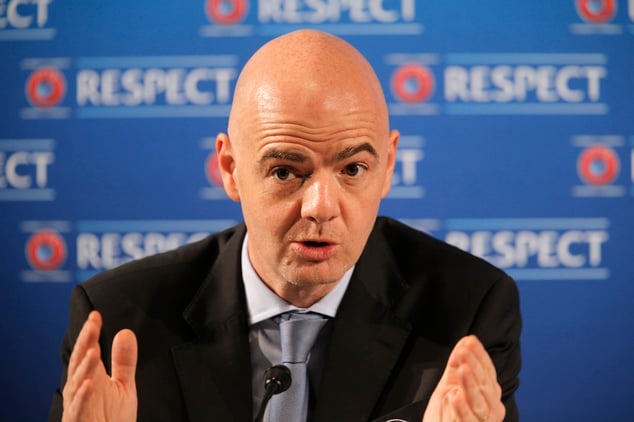FIFA 2026 World Cup Bidding Process Overhauled as Soccer Body Continues Repairing Public Image
Posted on: May 11, 2016, 11:33h.
Last updated on: May 11, 2016, 11:33h.

The FIFA 2026 World Cup bidding process will be a four-phase process that is designed to better vet potential host cities and countries on a series of conditions. The bidding procedure overhaul is the latest change at soccer’s governing body devised to repair its damaged image and improve public perception of its leadership.
On Tuesday at the 66th FIFA Congress in Mexico City, the Council announced that the four-phase scheme will begin with a new “strategy and consultation” period that will run now through next May. Bid preparation and receipt will be the next phase (June 2017 through December 2018), followed by bid evaluation in 2019 and a culminating final decision in May 2020.
FIFA has been engulfed in a widely publicized international scandal since early 2015 when seven current FIFA officials were arrested in Zurich on corruption charges and suspicions of accepting $200 million in bribes over the last two decades.
Though he stands only 5′ 3″, FIFA President Sepp Blatter was the biggest figure in soccer for nearly 30 years. FIFA’s Ethics Committee banned him from the sport for eight years (later reduced to six) last December amid the scandal.
Gianni Infantino replaced Blatter in February, and the organization moved quickly to repair its highly tarnished reputation. In addition to imposing term limits on presidents, FIFA launched a reform committee to lead the association’s restoration.
“I will work tirelessly to bring football back to FIFA and FIFA back to football,” Infantino said after taking the presidency. “This is what we have to do.”
World Cup bidding was previously reserved exclusively to the FIFA Executive Committee.
Reform the New Norm
FIFA’s decision to implement sweeping changes to its World Cup bidding process came as little surprise to soccer fans and analysts. Money was almost freely being exchanged in past decisions, with an untold millions of dollars in bribes in kickbacks changing hands.
US Attorney General Loretta Lynch said in December that FIFA leaders solicited payments through orchestrated schemes for rights to host not only the World Cup but also various marque matches including qualifiers and international friendlies.
“The betrayal of trust set forth here is outrageous,” Lynch said at the time. “The scale of corruption alleged herein is unconscionable.”
Infamous December
FIFA last selected World Cup hosts six years ago. On the very same day, December 2, 2010, FIFA announced it was awarding Russia the 2018 Cup and Qatar the 2022 tournament.
The one-two announcement almost immediately caused controversy as rumors of vote swapping emerged and bribery emerged.
Fuel was added to the firestorm of criticism surrounding FIFA when it was later revealed that working conditions at stadium construction sites in Qatar were extremely poor and workers were being abused.
FIFA says part of the new consultation phase will focus on human rights in order to evaluate a bidder’s qualifications. FIFA will also evaluate “sustainable event management” and “environmental protection” during the initial review period.
According to the association’s press release on the bidding changes, FIFA will additionally consider expanding the World Cup from 32 to 40 teams, with a decision expected sometime in the next 12 months.
No comments yet